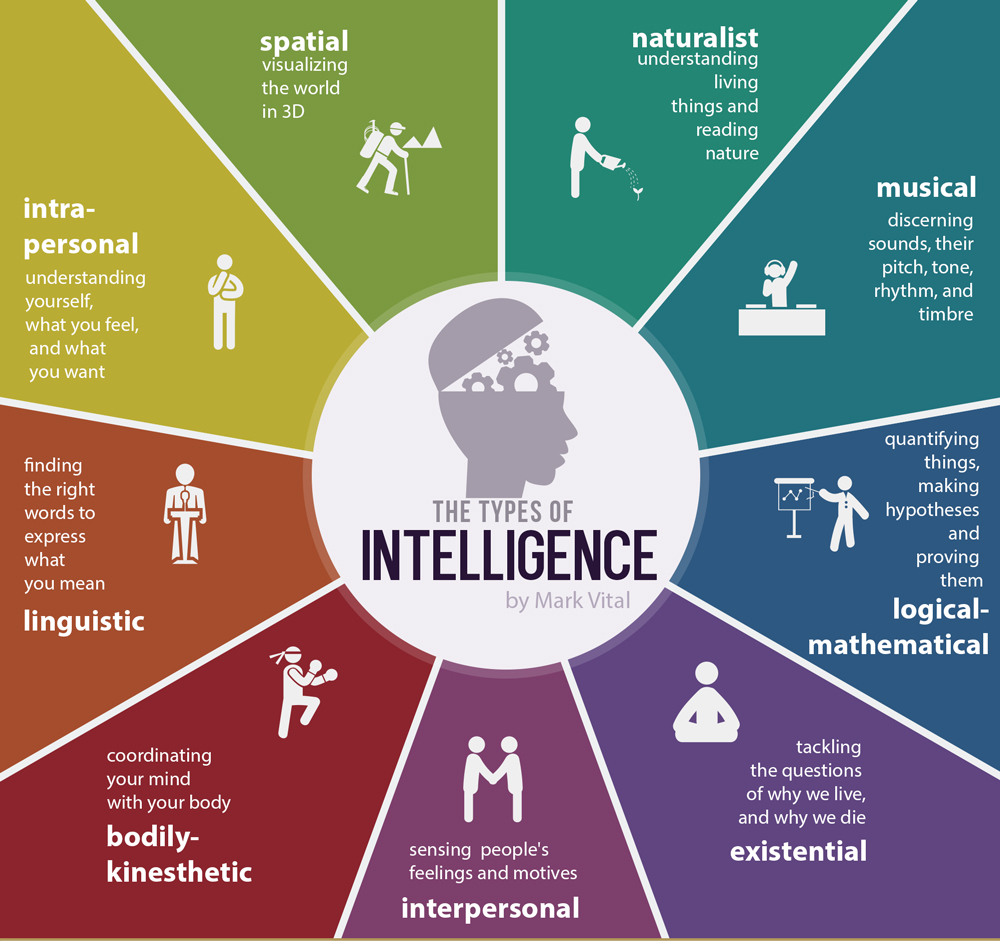Have you ever pondered the deeper meaning of life? Contemplated your purpose and the existence of the universe? These existential questions lie at the core of our human experience. Let is dive in the driving force behind these question and find out what is existential intelligence?
Join us as we delve into the fascinating realm of existential intelligence, understanding the characteristics of existential intelligence and discovering activities for existential intelligence. So, let’s embark on a journey of self-discovery and unravel the mysteries of our existence!
What is Existential Intelligence?
Existential intelligence, as proposed by psychologist Howard Gardner, refers to our ability to contemplate and tackle the profound questions of human existence.
It involves our capacity to reflect on life’s meaning, ponder philosophical concepts, grapple with the nature of reality, and explore our own purpose within the grand tapestry of existence.
Related: The 9 Different Types of Intelligence: Which Smart are you?

Characteristics of Existential Intelligence
To better understand what is existential intelligence, let’s explore some crucial aspects of existential intelligence. Here are some of the fundamental characteristics of existential intelligence –
1. Questioning the Meaning of Life
Existentially intelligent people possess a natural inclination to question the meaning and purpose of life. They seek to understand the deeper significance of their existence and explore philosophical and spiritual concepts.
2. Self-Reflection and Introspection
Existential intelligence is closely tied to self-reflection and introspection. Those with strong existential intelligence have a heightened ability to engage in deep introspection, examining their values, beliefs, and personal identity.
3. Embracing Uncertainty
Existential intelligence involves an acceptance of the inherent uncertainty and ambiguity of life. People with this intelligence are comfortable with the unknown and are open to exploring the mysteries and complexities that life presents.
4. Sensitivity to Existential Dilemmas
Existentially intelligent people possess a heightened sensitivity to existential dilemmas faced by themselves and others. They are empathetic and compassionate towards the struggles and existential challenges that are an inherent part of the human condition.
5. Appreciation of Beauty and Awe
Existential intelligence is closely tied to an appreciation of beauty and a sense of awe. Those with this intelligence often find inspiration and a profound sense of wonder in the natural world, artistic expressions, and transcendent experiences.
Activities for Existential Intelligence
Engaging existential intelligence can help us explore life’s meaning and understand existential questions. Here are some activities for existential intelligence –
1. Mindfulness and Meditation
Engaging in mindfulness and meditation practices cultivates self-awareness and facilitates deep introspection. By quieting the mind and focusing on the present moment, individuals can explore existential questions and gain insights into their own existence.
2. Reading and Reflecting on Philosophical and Spiritual Texts
Exploring philosophical and spiritual texts can provide a rich source of inspiration and provoke deep contemplation. Reading works by existentialist philosophers like Søren Kierkegaard, Jean-Paul Sartre, and Friedrich Nietzsche can stimulate existential intelligence.
3. Engaging in Meaningful Conversations
Having deep, meaningful conversations with others can be a powerful catalyst for exploring existential questions. Engage in dialogues that delve into topics such as purpose, mortality, spirituality, and the nature of reality, allowing for diverse perspectives and insights to emerge.
Related: What is Existential Depression? 15 Signs You Have It
4. Engaging with Nature
When you know existential intelligence, you realize that spending time in nature can evoke a sense of awe and wonder, fostering existential intelligence. Take walks in natural settings, observe the intricate beauty of the world around you, and contemplate the interconnectedness of all living things.
5. Creative Expression
Engaging in creative activities such as writing, painting, music, or dance can be a powerful outlet for exploring existential themes. Expressing thoughts and emotions through artistic mediums allows for a deeper exploration of one’s own existence.
6. Engaging with Existential Questions
Actively seeking out and reflecting upon existential questions can nourish existential intelligence. Consider questions like “What is the meaning of life?” or “What is my purpose?”.
Allow yourself the freedom to explore these profound inquiries without expecting definitive answers.
How to Improve Existential Intelligence
Improving existential intelligence involves nurturing and expanding our capacity to grapple with profound questions of existence and meaning. Here are some practical ways to understand what is existential intelligence and develop your existential intelligence:
1. Cultivate Self-Reflection
Set aside regular time for introspection and self-reflection. Create a space where you can contemplate your values, beliefs, and personal identity. Journaling can be a valuable tool for deepening your self-awareness.
2. Engage in Philosophical Inquiry
Actively seek out philosophical texts, both classical and contemporary, that explore existential themes. Read and reflect on the works of existentialist philosophers, consider their ideas and how they relate to your own experiences and beliefs.
3. Embrace Open-Mindedness
Approach existential questions with an open mind, free from preconceived notions or rigid beliefs. Be willing to question your assumptions and explore alternative perspectives. This is how to improve existential intelligence.
4. Seek Meaningful Conversations
Engage in conversations with others who are also interested in existential questions. Share your thoughts and listen attentively to different perspectives. Engaging in dialogue can broaden your understanding and challenge your own thinking.
5. Practice Mindfulness and Meditation
Cultivate mindfulness and present-moment awareness through meditation practices. By grounding yourself in the present, you can cultivate a deeper connection with your own existence and develop clarity of thought.
6. Connect with Nature
Spend time in natural settings and immerse yourself in the beauty of the natural world. Observe the intricate details of nature, such as the patterns in a flower or the vastness of the night sky.
7. Engage in Creative Expression
Explore creative outlets such as writing, painting, or music, to express and explore existential themes. Creative expression can provide a unique channel for processing and understanding existential questions and emotions.
8. Embrace Life-Defining Experiences
Engage in experiences that challenge and expand your perspective, such as traveling to new places, attending workshops, or participating in retreats. These experiences can expose you to different cultures, perspectives, and philosophical traditions.
9. Embrace Personal Growth
Commit to a lifelong journey of personal growth and self-development. Continually seek opportunities for learning, reflection, and expanding your horizons.
Embracing personal growth allows you to continually deepen your understanding of existential concepts and their relevance to your own life.
By actively engaging in these practices and approaches, you can nurture and improve your existential intelligence. Remember, it is a process that requires patience, curiosity, and a willingness to explore the deeper dimensions of your own existence.
Related: When Life Feels Empty: 7 Signs of an Existential Crisis and Ways to Cope
Takeaway
So what is existential intelligence? Existential intelligence invites us to embark on a journey of self-discovery, exploring the mysteries and deeper questions that shape our existence. By cultivating this unique aspect of our intelligence, we can gain a deeper understanding of ourselves, find meaning and purpose in our lives, and develop a profound appreciation for the beauty and complexity of the world around us.
So, embrace your existential intelligence, and let it guide you on a path of self-reflection, growth, and fulfillment. Remember, the quest for meaning is a lifelong journey that enriches every aspect of our being.
Frequently Asked Questions (FAQs):
What is an example of existentialist intelligence?
An example of existentialist intelligence is an individual’s ability to reflect on the meaning of life, make choices, and find purpose amid existential uncertainties.
How do you know if you have existential intelligence?
You may possess existential intelligence if you excel in contemplating life’s meaning, grappling with philosophical questions, and navigating existential complexities with depth and insight.
What is the learning style of existential intelligence?
The learning style of existential intelligence involves reflection, contemplation, and engaging with profound questions about life, purpose, and personal meaning.









Leave a Reply
You must be logged in to post a comment.